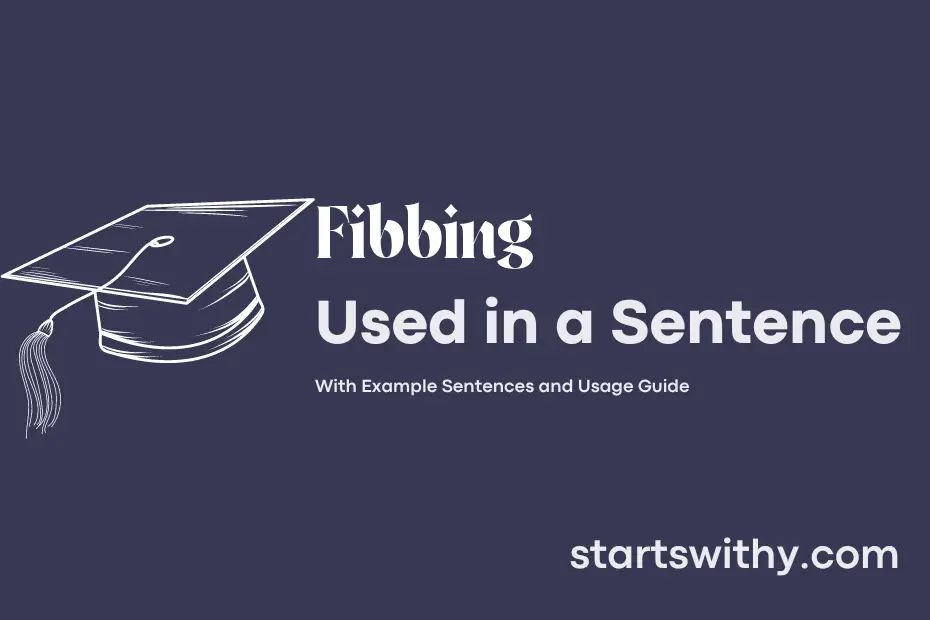Have you ever told a white lie to avoid hurting someone’s feelings or getting out of a sticky situation? This common act of bending the truth slightly is known as “fibbing.”
Fibbing involves telling a small untruth or exaggerating the truth to navigate social interactions or avoid confrontation. It can be a harmless way to smooth over awkward moments or spare someone’s feelings, but it can also lead to a loss of trust if done habitually.
7 Examples Of Fibbing Used In a Sentence For Kids
- Raju was fibbing when he said he had a pet elephant.
- Meena got caught fibbing about eating all the chocolates.
- The monkey was fibbing when he said he could fly like a bird.
- Riya was caught fibbing when she said she finished all her homework.
- The parrot was fibbing when he claimed he could speak French.
- The tiger was fibbing about being friends with all the animals in the jungle.
- The rabbit was fibbing when he said he could run faster than the cheetah.
14 Sentences with Fibbing Examples
- Fibbing about waking up early for those early morning lectures is quite common among college students.
- Some students are experts at fibbing about completing their assignments well before the deadline.
- Group projects often lead to students fibbing about their contribution to the work.
- Fibbing to convince professors about being unwell to skip classes is a common occurrence.
- Students tend to get caught fibbing when they use fake excuses for missing exams.
- Fibbing about having read all the assigned course materials is a tactic used by many students during class discussions.
- Talking about internship experiences, some students tend to resort to fibbing to make their work sound more impressive.
- Students often get caught fibbing when they pretend to be familiar with a topic during presentations.
- Fibbing about understanding complex theories to impress classmates is part of the college experience for some students.
- In order to extend deadlines, students may end up fibbing about facing technical difficulties with their assignments.
- Fibbing about social plans to avoid group studies is a common tactic among college students.
- Some students resort to fibbing to get out of extracurricular activities they have lost interest in.
- Fibbing about having ample study time to cover all subjects is a common excuse during exams.
- During job interviews, students may end up fibbing about their qualifications to secure better opportunities.
How To Use Fibbing in Sentences?
Fibbing is a fun and creative way to tell a little white lie or stretch the truth in a playful manner. When fibbing, you are making up a story or giving false information for entertainment or humor. To successfully use fibbing in a sentence, follow these steps:
- Start with a statement that sounds believable or realistic.
- Insert a false detail or piece of information that adds humor or intrigue.
- Keep a casual or light-hearted tone to indicate that you are fibbing.
- Make sure the fib is obvious enough for others to catch on to the joke.
For example, you could say, “I saw a purple elephant at the park yesterday.” This sentence starts off sounding like a normal statement, but the addition of a purple elephant is clearly a fib, as elephants are not typically purple. This playful use of fibbing can lead to laughter and enjoyment in a conversation.
Remember, fibbing should be done in a harmless and playful manner, and it’s important not to use it to deceive or hurt others. Practice using fibbing in a sentence with friends or family to improve your skills and have fun with language.
Conclusion
In summary, fibbing, or telling lies, can erode trust and damage relationships. When individuals engage in a pattern of dishonesty, they risk losing credibility and credibility with others. This can lead to a breakdown in communication and strained connections with those around them. It is important to remember that honesty is the foundation of healthy relationships, and being truthful is key to building and maintaining trust.
Furthermore, habitual fibbing can also have legal and ethical consequences, leading to potential conflicts and complexities in various aspects of life. By practicing honesty and transparency in our interactions, we can foster stronger and more fulfilling relationships and uphold integrity in our personal and professional endeavors. Ultimately, being truthful not only benefits others but also contributes to our own sense of integrity and well-being.



